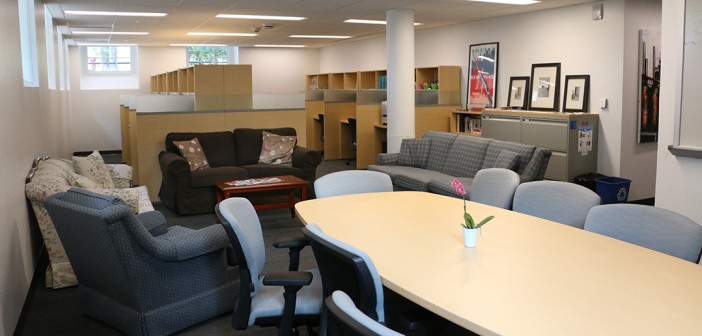In early 2014, consultants came to Lehigh to review the university’s local and regional community-engaged practices. Their investigation brought about a recommendation to create a center that would help to unify the many service-oriented groups on campus.
This semester, Lehigh introduced the Center for Community Engagement, a new hub for students, faculty and community members looking to engage in meaningful and reciprocal community work.
Sociology professor Sarah Stanlick, who has about a decade of community-engaged research, human rights and service learning experience, is now the director of the center.
“They found that there’s a lot of really great stuff happening but sometimes it’s not connected or sometimes it’s happening and nobody else knows about it,” Stanlick said.
A committee of professors, co-chaired by professors Judith Lasker and Elizabeth Dolan, collaborated during the past academic year to create a center that would facilitate academically-engaged research, learning and service. With the help of Donald Hall, the dean of the College of Arts and Sciences, they crafted a request to the provost’s office for seed funding for three years to establish the center.
“What we learned in the process is that this is actually a very common phenomenon across the country,” Lasker said.
She said most major universities have centers that collaborate with students, faculty, staff and community members to create opportunities for more productive community engagement.
The center, which is located in the basement of the newly-renovated Williams Hall, provides many resources to help students, faculty or community members to formulate community engagement-based projects and research, such as computers and training programs that assist people with the process of developing their service-based ideas. The center will be working with the Mellon Digital Humanities Initiative and the Strohl Undergraduate Research Grant to provide funding and support for such projects.
According to Stanlick, some of the programs hosted by the center will include brown bag discussions and lunch time trainings where faculty will share their experiences and skills related to community-engaged work. In the spring, Stanlick will also be teaching a sociology course entitled Values and Ethics of Community-Engaged Research, which will be open to all students who have an interest in service projects.
“We have so much going on now at Lehigh that broadly impacts the community that we always need better channels of communication and skills enhancement,” Hall wrote in an email. “If we see robust attendance at those offerings as well as a continuing growth in our community engagement, I think we will have succeeded.”
Stanlick said the center aims to guide the community to engage in mutually beneficial service.
“It’s not just Lehigh going into the community and saying, ‘We can help you,’” Stanlick said, “but actually connecting with the community and asking, ‘What is needed here? What would be welcome? What kind of partnership works with Lehigh and for you that we could do good things together?’”
Lasker, who teaches about health and medical care, said that in the past, students had often faced challenges when attempting to partake in meaningful community-based work.
“Oftentimes, students didn’t have the proper background to understand what they were getting into,” she said. “I thought, if there were people who actually knew how to do this well who could help me, then I could provide a better learning opportunity for students than I was doing.”
The center held an open house Aug. 27, during which many students and faculty members stopped by to learn more about the program.
“It was a very positive, buzzing atmosphere,” Stanlick said.
Many faculty members have expressed their interest in the center and look to contribute their expertise to help improve and diversify the engagement projects.
“I’m really looking forward to having our campus community work as one in truly meaningful, educational, research-based ways with our community,” said Carolina Hernandez, the director of community service, who serves as a student affairs liaison to the center. “The fact that we could be a part of working together and making our community stronger – there’s no better job on campus than what (Stanlick) and I are doing right now.”






Comment policy
Comments posted to The Brown and White website are reviewed by a moderator before being approved. Incendiary speech or harassing language, including comments targeted at individuals, may be deemed unacceptable and not published. Spam and other soliciting will also be declined.
The Brown and White also reserves the right to not publish entirely anonymous comments.